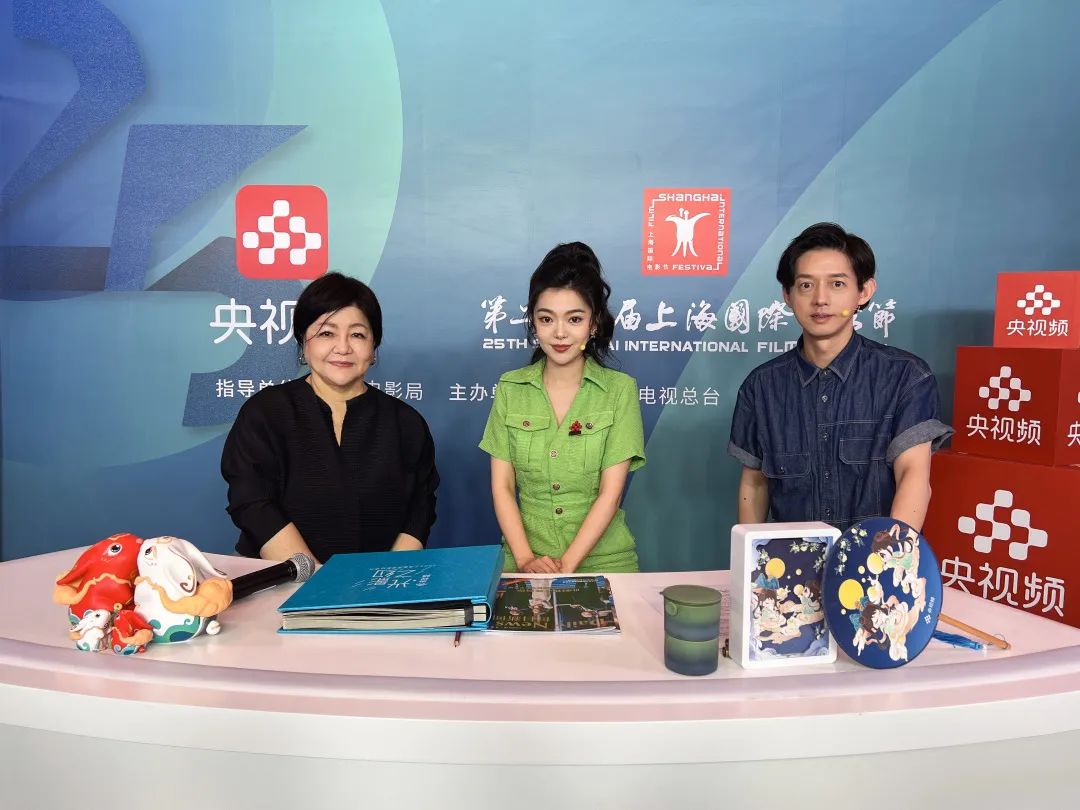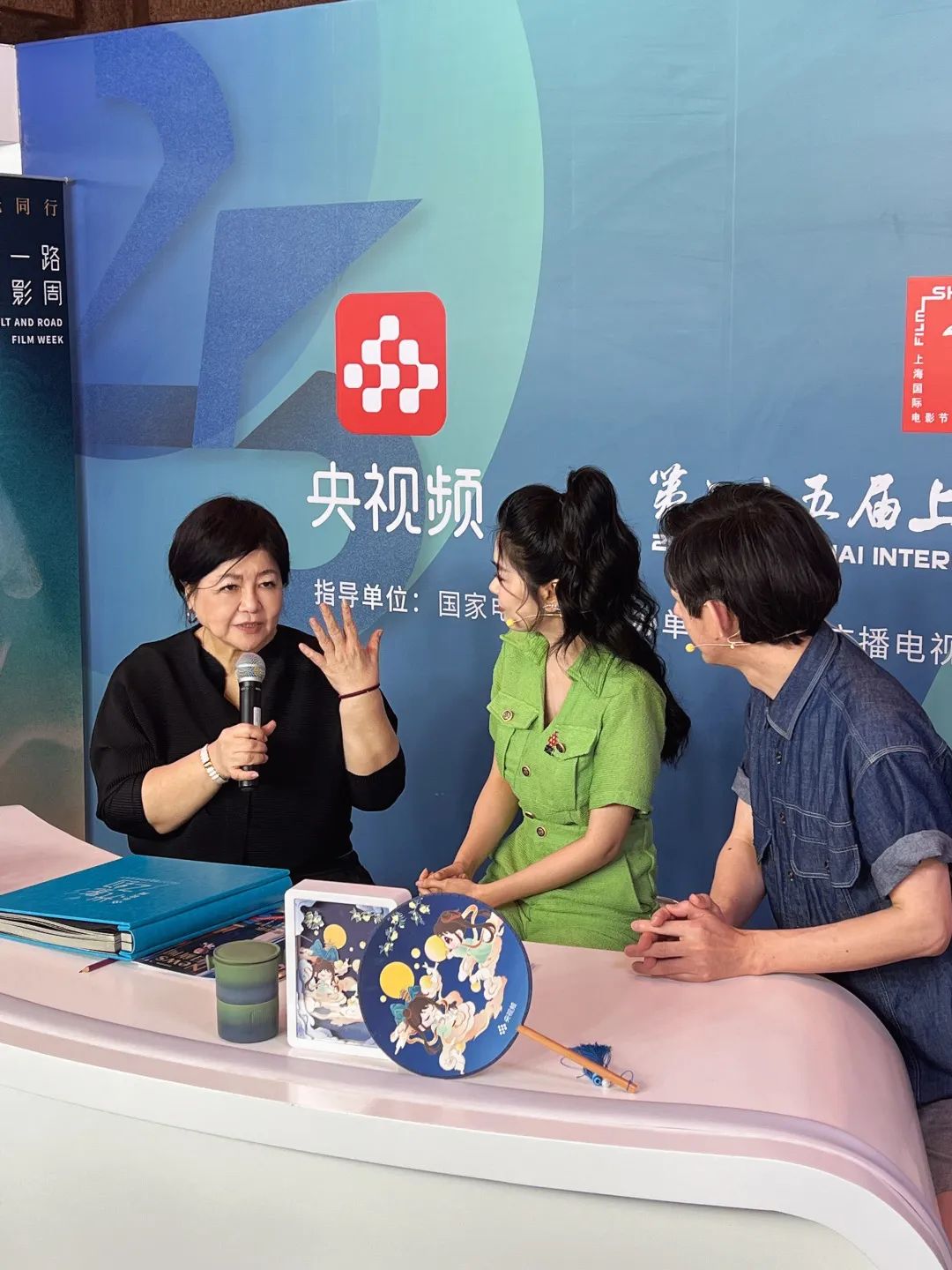Golden Goblet Reception Room|Peggy Chiao: Great Sense of Humor in Young Creators Today
This year marks the 30th anniversary of Shanghai International Film Festival (SIFF), and Peggy Chiao, a well-known filmmaker from Chinese Taiwan who has been a frequent guest since the first edition, is the jury president for the Short Film section of Golden Goblet Awards this year. The Short Film section is a crucial link in the festival’s “6+1” talent cultivation system, and it is her responsibility to support more young people to “establish themselves” in the film industry. On June 13, she talked about the significance of short films for the growth of young filmmakers and her thoughts on their works at the Golden Goblet Reception Room, a joint program of SIFF and China Media Group Mobile: “I watched a lot of short films this time, and many of them delved deeply into issues from all angles of society. Compared to their predecessors, young creators have become very humorous, less weighty, and very imaginative and creative in production.”
Short films, no more stepping stones
 Scene of the of Golden Goblet Reception Room
Scene of the of Golden Goblet Reception Room
There is an idea that short films are stepping stones for young people to enter the film industry. Peggy Chiao, a veteran producer, said, “It is not extractly true, but young people should definitely use short films as a good opportunity to practice and feel the gap between ideals, theory and practice.”
In 1981, Peggy Chiao graduated from a film and television school and subsequently joined the school as a lecturer. Eight years later, she co-wrote the film script RUAN LINGYU with Qiu Dai Anping, which was brought to the screen by director Guan Jinpeng. She then worked on a large number of film productions, like supervising the works of well-known filmmakers such as Wang Xiaoshuai and Tsai Mingliang. “Before newcomers start making a film, they imagine the filming process to be enjoyable, but when they actually get to shoot, even if it’s a short film, they can find that it's by no means easy. For example, some have to be trimmed, some have to be condensed, and some have to be enlarged, all of which take a great deal of energy.” These are tests for newcomers, she said, and it is in the bonding with the film that newcomers gradually gain experience and adjust their mindset. “Once they actually start making short films, young directors can start training their own teams to increase their understanding of each other and scale up their resources through networking in the industry – it’s important for new creators to build up resources for the future.”
Peggy Chiao used to be the jury president for the Golden Horse Awards at the Taipei Golden Horse Film Festival and has access to works of many award-winning directors, “They’ve all grown up from newcomers, and when you take out the first works of all these great directors and look at them, you will find it interesting to see how similar these debut works are to their works after they became famous. We can find their original creative intentions, their potentials and core elements, such as style, in their works that they showed as newcomers, which will actually remain unchanged.”
Peggy Chiao also notes that not all young people have ambitions to enter the feature film field, and that some of these people will also become a vibrant force in artistic short films. “These people basically don’t want to be bound by any commercial or market constraints. In terms of creation, they don’t want to be exposed to commercial principles, so they are willing to stay in the short film field because they feel they can bring into full play their imagination by making short films. And aside from rich genres, they don’t need to deal with audiences, cinemas or anyone in the distribution system,” from an artistic point of view, she said, these creators don’t need so-called stepping stones, “these people may have a wider space in imagination and creation.”
Different styles in today’s young filmmakers
 Scene of the of Golden Goblet Reception Room
Scene of the of Golden Goblet Reception Room
As a veteran producer, Peggy Chiao seems to have an innate keen eye for the talents of young filmmakers.
In the 1990s, she and her student Tsai Mingliang went to the 51st Venice International Film Festival with their work VIVE L’AMOUR, which was also shortlisted for the Golden Lion in the main competition, along with another young director, Jiang Wen’s work IN THE HEAT OF THE SUN. “In the end we took the Golden Lion and IN THE HEAT OF THE SUN took the Silver Lion for Xia Yu as the Best Actor.” Because of her full schedule in Venice, Peggy Chiao was not able to watch her “rival’s” work at once, so when she returned to Beijing, she took the initiative to contact Jiang Wen, “I asked him if I could watch it. Jiang Wen showed it to us in a small living room. I watched it with Jiang Xun, and as the plot developed, we both began to adjust our sitting posture with admiration for the director rising up in our hearts.”
It was already early in the morning after seeing the film and she and Chinese Taiwanese writer Jiang Xun were walking home in the moonlight, “Mr Jiang Xun was walking ahead of me. He is very characterful and romantic, and suddenly sang a passage from Yellow River Cantata loudly. I was particularly moved at the back. Later, I wrote a note to director Jiang Wen, saying ‘Director, I feel as if the Golden Lion should be yours, not ours’, and Jiang Wen was touched when he saw it, and we have become particularly good friends since then - I have always felt that he is very special, very talented director in China who thinks differently in every period.”
Having supported and witnessed the growth of generations of directors, Peggy Chiao will carefully analyze the differences between them. “Each generation of filmmakers has its own strengths, and the new generation is somewhat more powerful in terms of entertainment.” She is also very pleased with the young filmmakers of today, as they “have shown unique characteristics that belong to this era”. In terms of the social issues that young filmmakers are concerned with, “they are just as profound as their predecessors, but with a more relaxed attitude and a sense of humor, thus offering more delight to the audience.”
In the past few years, the Chinese film market has experienced a sudden explosion and the market is changing so fast that she feels some young people are becoming flashy, “but in the past two years they have started to devote themselves in creation.” She hopes that SIFF will become an “important place for young filmmakers to start afresh”.







